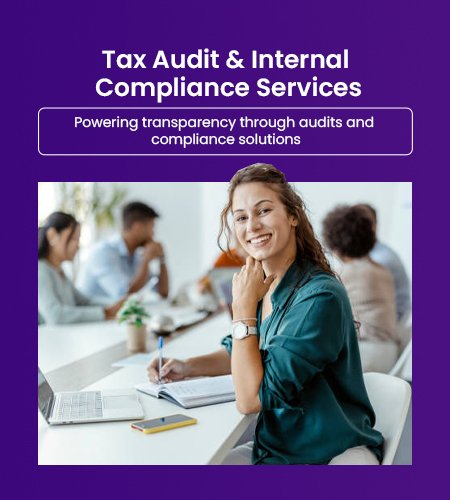
Tax Audit & Internal Compliance Services
- • Mandatory for specific turnover limits
- • Ensures accuracy in financial records
- • Verifies income and claim deductions
- • Avoids penalties and legal consequences
- • Conducted by certified tax auditors
- • Required for tax audit reporting
- • Details business compliance and transactions
- • Based on audit type (CA/CB)
- • Based on audit type (CA/CB)
- • Must meet strict reporting deadlines
- • Evaluates internal financial controls
- • Detects gaps in business processes
- • Supports regulatory and tax compliance
- • Supports regulatory and tax compliance
- • Improves overall business efficiency
- • Detects potential tax compliance risks
- • Prevents future legal tax issues
- • Ensures timely corrective actions
- • Strengthens business audit readiness
- • Reduces financial exposure significantly
Tax Compliance
Tax Audit & Internal Compliance Services
Comprehensive audit solutions to ensure regulatory compliance,
operational efficiency, and risk mitigation for your business
Tax Audit under Section 44AB of the Income Tax Act
Tax Audit under Section 44AB is a mandatory requirement under the Income Tax Act for businesses with turnover exceeding ₹1 crore (₹10 crore if 95% or more transactions are digital) and professionals with gross receipts over ₹50 lakh. It ensures proper maintenance and accuracy of financial records, detects tax avoidance, and promotes transparency. A Chartered Accountant must conduct this audit, and the report is submitted using Form 3CA/3CB and 3CD. Non-compliance may attract penalties under Section 271B. Accurate books, reconciliation, and timely filing are critical to compliance.
Features
Preparation & Filing of Form 3CA/3CB and Form 3CD
As part of the tax audit process, the Chartered Accountant prepares and submits either Form 3CA or Form 3CB, depending on whether the entity is subject to another statutory audit. Along with this, a comprehensive Form 3CD must be filed, detailing 44 financial particulars like payments, TDS, loans, depreciation, and compliance status. These forms must be filed electronically with the Income Tax Department before the deadline. Errors or omissions in these reports can trigger scrutiny or assessment notices, hence accuracy and completeness of information are paramount during submission.
Features
Internal Audit for Operational Efficiency
An internal audit is a management tool used to evaluate the effectiveness of internal controls, risk management, and governance. Though not mandatory under tax laws, it is widely adopted by companies for maintaining efficiency, transparency, and compliance. It helps identify gaps, detect fraud, assess operational performance, and prepare the organization for statutory audits. Internal audits are especially beneficial for companies planning expansion, seeking funding, or undergoing regulatory scrutiny. The scope and frequency of such audits can be customized depending on the organization's size, nature of operations, and regulatory environment.
Features
Tax Risk Identification and Management
Tax risk identification and management is the process of recognizing areas where a company may face tax exposure or compliance issues. It involves proactively monitoring changes in tax laws, reviewing tax-sensitive transactions, and maintaining transparent documentation. Businesses that engage in cross-border transactions, mergers, or high-value deals are especially at risk and benefit from regular tax risk assessments. Implementing a tax risk matrix helps companies identify vulnerable areas and manage them before they escalate into disputes or penalties. It builds a culture of compliance and minimizes the likelihood of tax litigation.
Features
Applicability & Compliance Matrix
| Subtopic | Applicable To | Mandatory/Optional | Statutory Form | Filing Deadline |
|---|---|---|---|---|
| Tax Audit under Section 44AB | Businesses & Professionals (as per limit) | Mandatory | Form 3CA/3CB & 3CD | 30th September (AY-wise) |
| Preparation & Filing of 3CA/3CB and 3CD | Entities under tax audit | Mandatory | Form 3CA/3CB, Form 3CD | Same as above |
| Internal Audit for Operational Efficiency | Companies (optional unless regulated) | Optional (unless listed) | As per internal structure | As per internal policy |
| Tax Risk Identification & Management | Medium to large companies | Optional | Internal Risk Register | Continuous/Periodic |
Ensure Compliance with Expert Audit Services
Our team of professionals can help you navigate complex tax audit requirements and implement effective internal controls.
Get Expert Assistance© ROKADH FINANCIAL SERVICES PRIVATE LIMITED

